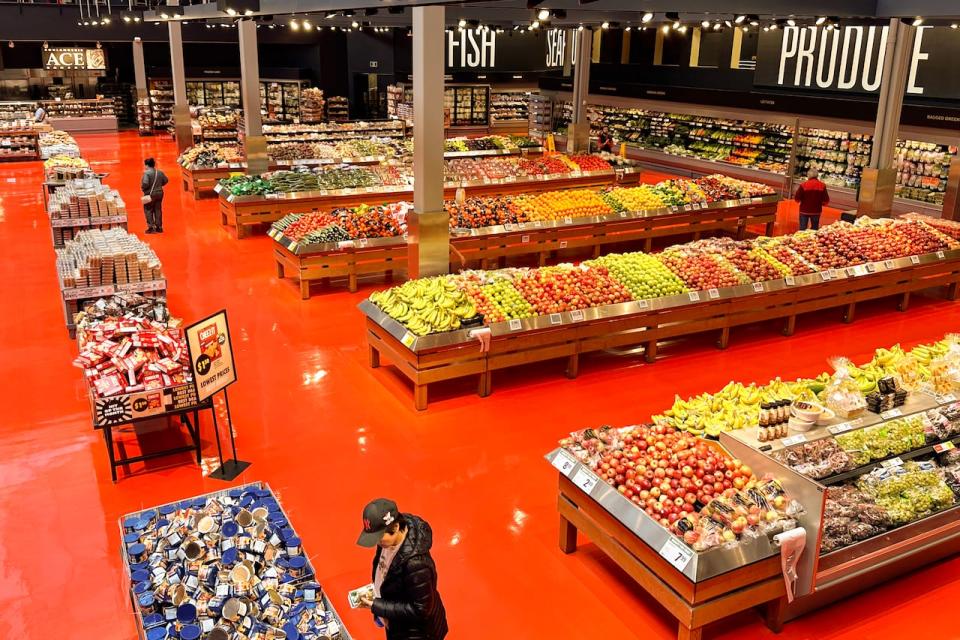The head of the Quebecor telecommunications and media firm is asking the federal government to intervene in a deal between Loblaw and a company owned by Rogers and Bell that would force his company and others out of 180 Loblaw-owned stores.
In a letter sent by Pierre Karl Péladeau to Industry Minister François-Philippe Champagne on May 9, Quebecor’s CEO says Loblaw has decided to “prematurely terminate” Quebecor’s contract for wireless devices and services at the in-store telecommunications kiosks Loblaw groceries – a deal he calls it. -competitive and contrary to the interests of consumers.
The supermarket kiosks owned by Loblaw are The Mobile Shop and there are 180 of them across the country. Currently, the kiosks sell cell phone plans from seven providers, including Telus and Quebecor’s Freedom Mobile.
On the brand’s “about” page, Mobile Shop says “we don’t work for just one carrier, so we don’t play favorites.”
In his letter, obtained by CBC News, Péladeau says The Mobile Shop will soon sell only Glentel products. Glentel is a retailer owned by Bell and Rogers.

Quebecor chief executive Pierre-Karl Peladeau speaks to the media after the company’s annual meeting Thursday, May 9, 2024 in Montreal. (Ryan Remiorz/The Canadian Press)
“(Loblaw) presents this decision as a simple supply option for its stores, but in our opinion, this is an approach aimed at excluding certain other cellular telephone operators for the benefit of the Glentel company,” says Péladeau in the letter, translated from the French. .
“If Glentel gets that favor from Loblaw, it’s because it’s a joint venture made up of giants Bell and Rogers that once again tries to lock out competition and hold Canadians hostage in their consumer choice.”
In his letter, Péladeau asks Champagne to intervene “directly and firmly” against Loblaw, Rogers, Bell and Glentel.
In a statement, The Mobile Shop says its business represents “less than five per cent of sales in mobile phones and plans in Canada.
“Based on our limited presence in the mobile market, our decision as to which carrier to sell does not do anything to compete,” the statement says. “We are constantly reviewing our offering, and will continue to offer a range of options, including strong low-cost national options and full service plans.”
In his letter, Péladeau also questions the existence of Glentel, a company jointly owned by two of Canada’s largest telecommunications companies, Bell and Rogers.
In 2015, the Canadian Competition Bureau allowed the company’s joint acquisition to go through, on the condition that the two telecommunications giants set up an “administrative firewall” to prevent the sharing of sensitive competitive information.
The bureau expressed concern that the acquisition would “significantly reduce competition in the wireless sector.”
In the letter, Péladeau says that although his company has contacted Loblaw’s head office regarding the deal with Glentel, “they have continued, putting commercial interests over the interest of the consumer.
“It is imperative that steps be taken to preserve a level playing field in the telecommunications and grocery sectors for the benefit of the Canadian public.”
Increased screening for grocers, telecommunications companies
Péladeau’s letter comes as grocers and telecommunications companies come under increased price pressure.
A movement to boycott Loblaw is underway after the grocery giant reported $13.58 billion in revenue in the first quarter of 2024.
Loblaw agreed last week to sign up to the government’s grocery code of conduct – but only if rivals do as well. The code aims to address long-standing issues such as arbitrary fees, cost increases imposed without notice and late payments.


The nearly empty produce section of Loblaws Toronto Friday, May 3, 2024. A group of shoppers called ‘Loblaws out of control,’ which has 62,000 members, launched a boycott over the month of May to protest what it calls the company. high prices. (Chris Young/The Canadian Press)
The federal government says it wants to entice international grocers to set up shop in Canada in an effort to lower prices.
The federal NDP forced a debate on Tuesday on a motion calling for an excess profit tax. The party has called for such a tax for a long time.
Similarly, the industry minister said earlier this year that Canadians are still paying too much for telecommunications services after Rogers said it would raise the cost of some of its wireless plans for non-contract customers.
“Let’s be clear. While some progress has been made to lower prices, Canadians still pay too much and don’t see too much competition,” Champagne said in January.